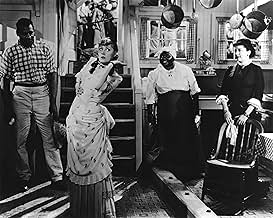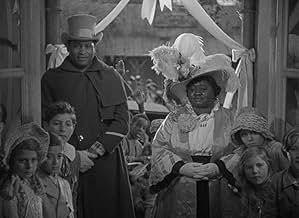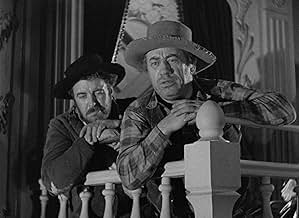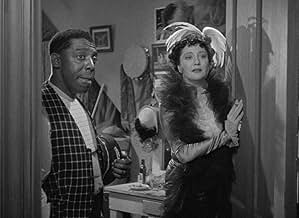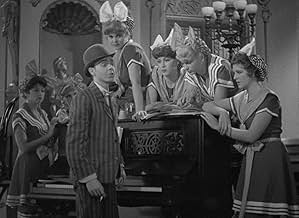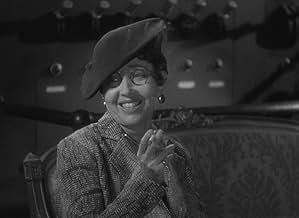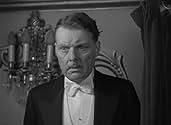Show Boat
- 1936
- Tous publics
- 1h 53min
NOTE IMDb
7,4/10
3,9 k
MA NOTE
Ajouter une intrigue dans votre langueDespite her mother's objections, the naive young daughter of a show boat captain is thrust into the limelight as the company's new leading lady.Despite her mother's objections, the naive young daughter of a show boat captain is thrust into the limelight as the company's new leading lady.Despite her mother's objections, the naive young daughter of a show boat captain is thrust into the limelight as the company's new leading lady.
- Réalisation
- Scénario
- Casting principal
- Récompenses
- 3 victoires et 1 nomination au total
Maude Allen
- Fat Woman
- (non crédité)
Avis à la une
No question that this is the Show Boat with soul. The '51 version has some lovely chorus numbers, including a beautiful opening sequence, but it is entirely safe and a predictable piece of MGM-dom.
On this 1936 version, I found myself thinking "There isn't a dull moment in this thing".
The pacing is fast and most unsentimental. The editing is so curt as to be almost surreal, and songs are suddenly launched out of nowhere, which is curiously satisfying. To be truthful, the film's strongest cohesive stretch is its first third, after which the story-telling becomes a bit rushed (presumably) to keep the film to a tolerable length. Hattie McDaniel and Paul Robeson are magical. McDaniel's first scene is positively electric and Robeson is given to a pleasant, warm demeanor, and both he and McDaniel seem surprisingly modern during a time in which blacks were seldom portrayed as such, especially in a mixed cast.
Charles Winninger shows his Vaudeville roots here, and he does a most riveting take on the Show Boat stage, portraying a melodrama for two. His timing is perfect, and his energy is inspiring throughout the picture.
Magnolia's blackface peregrinations do ring true to the time (more 1870's, than 1930's), but the wince-worthy scenes are more those of the black river boat hands who must constantly be shown bucking and winging their way to the irresistible music, eyes rolling.
The ending has some satisfaction to it, and is lightened considerably by the fact that Gaylord Ravinal is not completely humiliated by story's end. This last scene must have somehow anticipated "A Star Is Born", with undying love and honor being its undercurrent theme.
George Gershwin once stated on network radio that Kern's [Show Boat] score was the finest light opera in American history. It may still be. Just the bridge to "Only Make Believe" is heart stopping stuff.
On this 1936 version, I found myself thinking "There isn't a dull moment in this thing".
The pacing is fast and most unsentimental. The editing is so curt as to be almost surreal, and songs are suddenly launched out of nowhere, which is curiously satisfying. To be truthful, the film's strongest cohesive stretch is its first third, after which the story-telling becomes a bit rushed (presumably) to keep the film to a tolerable length. Hattie McDaniel and Paul Robeson are magical. McDaniel's first scene is positively electric and Robeson is given to a pleasant, warm demeanor, and both he and McDaniel seem surprisingly modern during a time in which blacks were seldom portrayed as such, especially in a mixed cast.
Charles Winninger shows his Vaudeville roots here, and he does a most riveting take on the Show Boat stage, portraying a melodrama for two. His timing is perfect, and his energy is inspiring throughout the picture.
Magnolia's blackface peregrinations do ring true to the time (more 1870's, than 1930's), but the wince-worthy scenes are more those of the black river boat hands who must constantly be shown bucking and winging their way to the irresistible music, eyes rolling.
The ending has some satisfaction to it, and is lightened considerably by the fact that Gaylord Ravinal is not completely humiliated by story's end. This last scene must have somehow anticipated "A Star Is Born", with undying love and honor being its undercurrent theme.
George Gershwin once stated on network radio that Kern's [Show Boat] score was the finest light opera in American history. It may still be. Just the bridge to "Only Make Believe" is heart stopping stuff.
There are a couple of famous, great songs in the opening 15 minutes of this film that hooked me in to watch the entire two-hour film.
I don't think the two-hour production ever wound up matching those early minutes but I still enjoyed it enough to give it "8 stars." Also, I still think it's better than the more-famous 1951 color re-make. It's a shame this 1936 film is not available on DVD, at least at this point here in the U.S.
Funny, but I did not particularly care for the two leading actors voices - Irene Dunne and Allan Jones. They are just two high-pitched for my tastes. I preferred the deep voice of Paul Robeson and was pleasantly surprised how well Hatie McDaniel sang.
The fun part of the film, however, wasn't the music but the story. It's pretty entertaining and a key reason for that was Charles Winniger, who keeps it alive with good humor. All the characters, except for Helen Westley's, are "good guys." and nice to follow. The story has a good mixture of drama, humor, sadness, sentimentality and song.
Also, there is some nice closeup photography with some great facial expressions. Some just make you laugh right out loud.
I am in agreement with those who think "Show Boat" was the best-ever and very good feel-good film.
I don't think the two-hour production ever wound up matching those early minutes but I still enjoyed it enough to give it "8 stars." Also, I still think it's better than the more-famous 1951 color re-make. It's a shame this 1936 film is not available on DVD, at least at this point here in the U.S.
Funny, but I did not particularly care for the two leading actors voices - Irene Dunne and Allan Jones. They are just two high-pitched for my tastes. I preferred the deep voice of Paul Robeson and was pleasantly surprised how well Hatie McDaniel sang.
The fun part of the film, however, wasn't the music but the story. It's pretty entertaining and a key reason for that was Charles Winniger, who keeps it alive with good humor. All the characters, except for Helen Westley's, are "good guys." and nice to follow. The story has a good mixture of drama, humor, sadness, sentimentality and song.
Also, there is some nice closeup photography with some great facial expressions. Some just make you laugh right out loud.
I am in agreement with those who think "Show Boat" was the best-ever and very good feel-good film.
9B24
I was too young to see this version until well after the 1951 one had fixed a certain standard in my brain. It took a TCM rerun to open my eyes. Mind you, I still like the 1951 production very well indeed, but there is a depth of story, song, and character in this one that makes it overall the better of the two (and the "best" of a larger lot).
First, you have Paul Robeson and Helen Morgan. Both are icons who needed no dubbing no matter where or when they sang standards like "Old Man River" and "Just My Bill." Then there is Hattie McDaniel in a role largely skipped in the 1951 movie. And a greater selection of minor songs prevails as well. Indeed, the inclusion of many black people who are missing from the later film give it a unique richness.
Black and white never looked so good.
First, you have Paul Robeson and Helen Morgan. Both are icons who needed no dubbing no matter where or when they sang standards like "Old Man River" and "Just My Bill." Then there is Hattie McDaniel in a role largely skipped in the 1951 movie. And a greater selection of minor songs prevails as well. Indeed, the inclusion of many black people who are missing from the later film give it a unique richness.
Black and white never looked so good.
This movie is a wonderful stage-to-screen musical film. It stuck to the original musical play and had wonderful stars. Irene Dunne as the young innocent Magnolia Hawks, Allan Jones as the charming gambler Gaylord Ravenal, Charles Winninger as Cap'n Andy Hawks, Paul Robenson as Joe, and Helen Morgan, in the role she originated on stage, as Julie LaVerne. This film is a musical drama with comedy and racial references. This film is a great musical about racial differences and the reactions of people, back then, with different races. That is what makes this film a landmark musical and also one of AFI's 100 Years of Musicals and was #24 out of 25 musicals. This version of "Show Boat" is known to be the best movie version of all three movie versions. The 1929 version was not done very well because it was a very early talkie and the numbers weren't heard correctly. The 1951 version was much too sanitized and it took out the value of the whole show. "Show Boat" is a very entertaining and beautiful film.
Stunning, astounding achievement for 1930s Hollywood cinema. An early talkie musical that boasts excellent sound and breathtaking cinematography that points the way to the modern era of movies, including closeups and all sorts of rolling and perspective shots that were new in their time. This adaptation of the legendary Broadway musical (considered the first modern musical) is shortened somewhat to keep it around two hours, so the plot often seems to race through some pretty dramatic events. Veterans from the stage version appear in key roles, including Charlie Winninger as Captain Andy, Paul Robeson as Joe and Helen Morgan as Julie. While there are several cringe-worthy "Negro" moments, including Irene Dunne performing in black face, at the very least Robeson is handled with respect throughout. I must be honest and admit I am not crazy about Dunne as Magnolia, although Allan Jones makes a fine Gaylord Ravenal. I think Universal might have found someone a bit softer around the edges to play Magnolia, as much as I admire most of Dunne's film work. This is an almost perfect movie, and it is amazing that it was shot on back lots. As with Edna Ferber's stories, on which it is based, SHOW BOAT will transport you to another time and place, at least for two hours.
Le saviez-vous
- AnecdotesSpecial permission had to be granted from the Hays Office in order to retain the famous miscegenation (interracial marriage) sequence in the movie. Miscegenation was banned as a film subject, and had been excluded from Show-Boat (1929).
- GaffesWhen Joe begins to sing "Ol' Man River", he picks up a board and begins to whittle it. He slices off two pieces, and then the camera switches to an oblique shot, but now the board is whittled to a slender rod.
- Crédits fousIn the opening credits, there is a cardboard cutout display of a show boat parade, with cutout paper townspeople watching it, on a moving turntable. The parade revolves past the camera carrying cardboard banners on which are printed the title and other credits. Most of the parade figures are simply figures, but among them cutouts of Paul Robeson and Helen Morgan can be seen. (The appearance of these figures does not coincide with the appearance of their names onscreen.) In the background shadows of a paddlewheel and a riverboat can be seen.
- ConnexionsFeatured in The All Talking, All Singing, All Dancing Show (1973)
- Bandes originalesCotton Blossom
(1927) (uncredited)
Music by Jerome Kern
Lyrics by Oscar Hammerstein II
Sung by offscreen mixed chorus (during opening credits) and in opening scene by mixed chorus of dock workers
Meilleurs choix
Connectez-vous pour évaluer et suivre la liste de favoris afin de recevoir des recommandations personnalisées
- How long is Show Boat?Alimenté par Alexa
- This version of "Show Boat" is supposed to be extremely faithful to the stage musical. What changes have been made?
Détails
- Durée1 heure 53 minutes
- Couleur
- Rapport de forme
- 1.37 : 1
Contribuer à cette page
Suggérer une modification ou ajouter du contenu manquant


